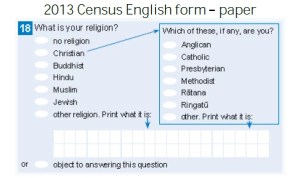The long awaiting national census data was released yesterday, and there is much to digest.
As expected, the number and proportion of people with no religion has overtaken the number and proportion of Christians. Massively.
However, as we seek to make sense of the implications, there are a few things to be aware of.
Number of Christians
Interestingly, the number of people affiliated with Christianity declined by only 6.5% from 1,858,980 in 2013 to 1,738,638 in 2018. The number of people affiliated with Maori religions, including Ratana and Ringatū, increased by 18.3% from 52,947 in 2013 to 62,638 in 2018. Taking both these categories together, the decline in numbers was just under 6%.
Question wording
It is also important to note that the wording of the Religion question changed dramatically from 2013 to 2018. In 2013, there was a tick box of options, replaced in 2018 by on open-ended question, inviting a thorough response (“Give as much detail as you need to name your religion, eg Presbyterian, Ratana …”). For Christians, the new wording was a perhaps difficult. The question, “What is your religion?” would, for many, be answered, “Christian” rather than specifying a particular denomination, but the examples provided presumed that a denominational affiliation was required. This change in wording is likely to account for some of the drop in denominational affiliation, and the concurrent increase in those who stated they were Christians, without necessarily further defining a specific denomination (the number of those who responded “Christian” was up 42%, from 216,177 in 2013 307,926 in 2018). (More on this next time.)
Everyone responded
Another key difference in 2018 was there were no reported “no responses”. When you consider that nearly 350,000 people did not respond to the question in 2013, this is a major point of difference that needs to be factored into interpretation and analysis. I need to check for sure whether it was compulsory to answer the question in the online form, but if that was the case, as I presume it was, this would likely increase the number of people selecting the “No religion” or “Object to state” boxes (and perhaps account for some of the 4,000 “Church of the Flying Spaghetti Monster” affiliates!) Alternative data sources, including previous census data were used to fill gaps. (Again, I am not clear if that was just for paper-based forms, or if it was also necessary/possible on online completions.)
Data quality
Statistics NZ rated the religious affiliation variable data as high quality. Some 8% of responses were sourced from responses to the 2013 Census. While some of those respondents may have changed their religious affiliation, I reckon this is pretty accurate data. Although the pastafarian affiliation may be a little high!
So…
Proportion of Christians is definitely way down.
Actual numbers of Christians has also dropped, but less dramatically.
In 2013, 350,000 people skipped the question. Not the case in 2018. I suspect that is makes the difference between the 2013 and 2018 data larger than it would have been if people had been required to state in 2013, when they would have ticked the “object” or “no religion” box, rather than choosing one of the religious affiliations.



